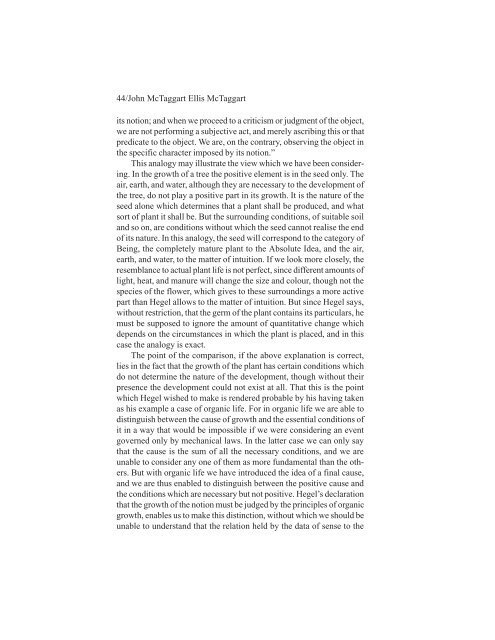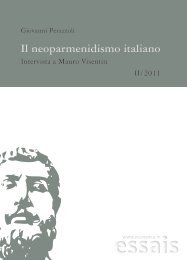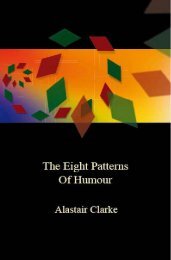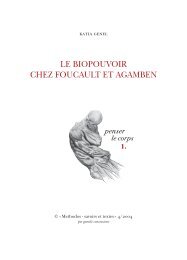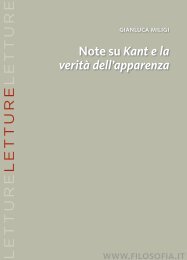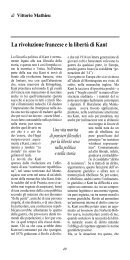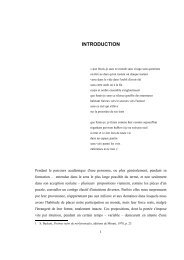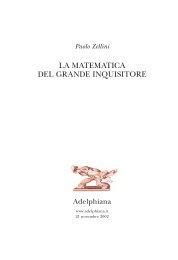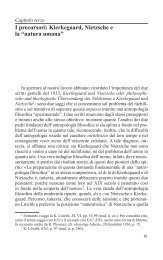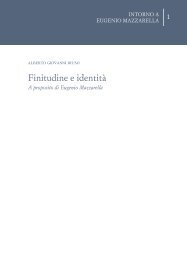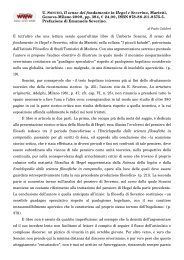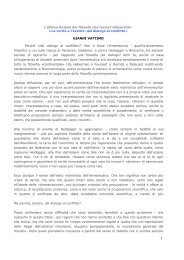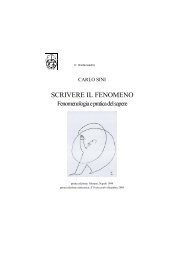McTaggart, Studies in the Hegelian Dialectic
McTaggart, Studies in the Hegelian Dialectic
McTaggart, Studies in the Hegelian Dialectic
You also want an ePaper? Increase the reach of your titles
YUMPU automatically turns print PDFs into web optimized ePapers that Google loves.
44/John <strong>McTaggart</strong> Ellis <strong>McTaggart</strong><br />
its notion; and when we proceed to a criticism or judgment of <strong>the</strong> object,<br />
we are not perform<strong>in</strong>g a subjective act, and merely ascrib<strong>in</strong>g this or that<br />
predicate to <strong>the</strong> object. We are, on <strong>the</strong> contrary, observ<strong>in</strong>g <strong>the</strong> object <strong>in</strong><br />
<strong>the</strong> specific character imposed by its notion.”<br />
This analogy may illustrate <strong>the</strong> view which we have been consider<strong>in</strong>g.<br />
In <strong>the</strong> growth of a tree <strong>the</strong> positive element is <strong>in</strong> <strong>the</strong> seed only. The<br />
air, earth, and water, although <strong>the</strong>y are necessary to <strong>the</strong> development of<br />
<strong>the</strong> tree, do not play a positive part <strong>in</strong> its growth. It is <strong>the</strong> nature of <strong>the</strong><br />
seed alone which determ<strong>in</strong>es that a plant shall be produced, and what<br />
sort of plant it shall be. But <strong>the</strong> surround<strong>in</strong>g conditions, of suitable soil<br />
and so on, are conditions without which <strong>the</strong> seed cannot realise <strong>the</strong> end<br />
of its nature. In this analogy, <strong>the</strong> seed will correspond to <strong>the</strong> category of<br />
Be<strong>in</strong>g, <strong>the</strong> completely mature plant to <strong>the</strong> Absolute Idea, and <strong>the</strong> air,<br />
earth, and water, to <strong>the</strong> matter of <strong>in</strong>tuition. If we look more closely, <strong>the</strong><br />
resemblance to actual plant life is not perfect, s<strong>in</strong>ce different amounts of<br />
light, heat, and manure will change <strong>the</strong> size and colour, though not <strong>the</strong><br />
species of <strong>the</strong> flower, which gives to <strong>the</strong>se surround<strong>in</strong>gs a more active<br />
part than Hegel allows to <strong>the</strong> matter of <strong>in</strong>tuition. But s<strong>in</strong>ce Hegel says,<br />
without restriction, that <strong>the</strong> germ of <strong>the</strong> plant conta<strong>in</strong>s its particulars, he<br />
must be supposed to ignore <strong>the</strong> amount of quantitative change which<br />
depends on <strong>the</strong> circumstances <strong>in</strong> which <strong>the</strong> plant is placed, and <strong>in</strong> this<br />
case <strong>the</strong> analogy is exact.<br />
The po<strong>in</strong>t of <strong>the</strong> comparison, if <strong>the</strong> above explanation is correct,<br />
lies <strong>in</strong> <strong>the</strong> fact that <strong>the</strong> growth of <strong>the</strong> plant has certa<strong>in</strong> conditions which<br />
do not determ<strong>in</strong>e <strong>the</strong> nature of <strong>the</strong> development, though without <strong>the</strong>ir<br />
presence <strong>the</strong> development could not exist at all. That this is <strong>the</strong> po<strong>in</strong>t<br />
which Hegel wished to make is rendered probable by his hav<strong>in</strong>g taken<br />
as his example a case of organic life. For <strong>in</strong> organic life we are able to<br />
dist<strong>in</strong>guish between <strong>the</strong> cause of growth and <strong>the</strong> essential conditions of<br />
it <strong>in</strong> a way that would be impossible if we were consider<strong>in</strong>g an event<br />
governed only by mechanical laws. In <strong>the</strong> latter case we can only say<br />
that <strong>the</strong> cause is <strong>the</strong> sum of all <strong>the</strong> necessary conditions, and we are<br />
unable to consider any one of <strong>the</strong>m as more fundamental than <strong>the</strong> o<strong>the</strong>rs.<br />
But with organic life we have <strong>in</strong>troduced <strong>the</strong> idea of a f<strong>in</strong>al cause,<br />
and we are thus enabled to dist<strong>in</strong>guish between <strong>the</strong> positive cause and<br />
<strong>the</strong> conditions which are necessary but not positive. Hegel’s declaration<br />
that <strong>the</strong> growth of <strong>the</strong> notion must be judged by <strong>the</strong> pr<strong>in</strong>ciples of organic<br />
growth, enables us to make this dist<strong>in</strong>ction, without which we should be<br />
unable to understand that <strong>the</strong> relation held by <strong>the</strong> data of sense to <strong>the</strong>


